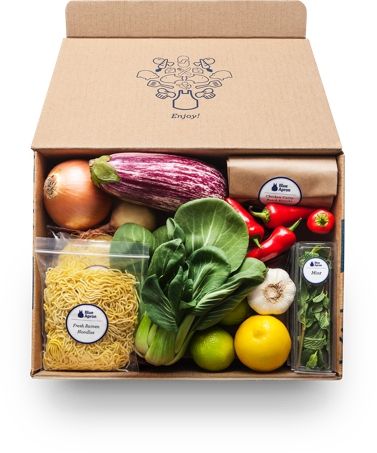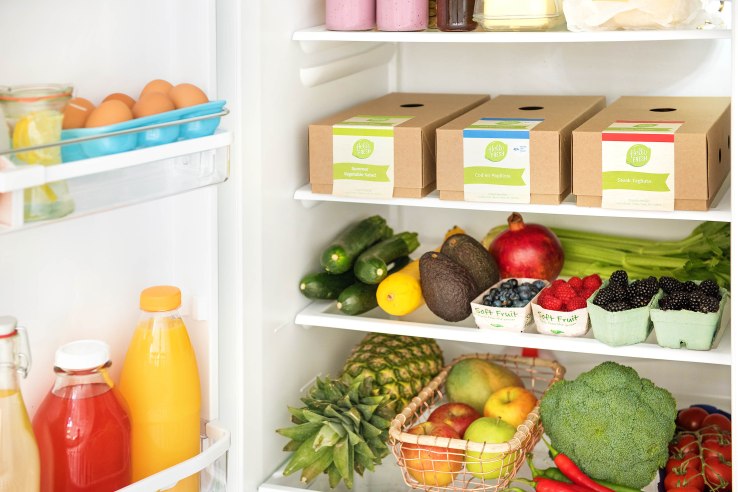When they started operating in the U.S. about five years ago, meal kit companies looked big, disruptor-sized, poised to transform the way people eat entirely. They were even seen as a potential thorn in the side of the massive U.S. grocery industry, which racks up about $650 billion in annual sales.
Now, meal kit companies are facing an onslaught of competition from newcomers and big food brands alike. Turning a profit has proven elusive. And somewhat embarrassingly, it looks like meal kit companies need to emulate the brick-and-mortar groceries and online retailers they once criticized for overwhelming shoppers with choices. To go truly mainstream, they need to diversify their offerings.
It’s not a path that founders, or their investors, imagined at the outset.
At the advent of meal kit services, the idea was to keep it simple– package up already measured ingredients with a recipe card, and ship these to subscribers’ doors. Meal kits would spare customers annoying lines at the grocery store, and teach them a few culinary skills along the way. Meanwhile, the companies planned to collect data about consumers’ dining preferences.
 Sun Basket meal kit ingredients.
Sun Basket meal kit ingredients.
Kevin Diestel of Sapphire Ventures explains the appeal of his own portfolio company, Sun Basket, and other meal kit makers by comparing them to earlier subscription services that used big data to drive their business success. “They’re riding the same wave in grocery that Netflix did in video and Amazon did in e-commerce,” he said.
Based on the number of meal kit delivery companies to receive meaningful rounds of funding, it’s clear that other investors agree. Notable players in the space operating stateside include early pioneers Plated, Blue Apron and Hello Fresh, along with Home Chef, Peach Dish, Purple Carrot, Gobble, Marley Spoon, Green Chef and Chef’d.
Even e-grocers like Fresh Direct and Good Eggs are starting to offer meal kits now. Meanwhile, traditional groceries or specialty food markets like Publix, and Ahold’s Giant-Carlisle are selling meal kits in their brick-and-mortar stores.
 Purple Carrot’s vegan “TB12” meal kits were created with the NFL’s Tom Brady.
Purple Carrot’s vegan “TB12” meal kits were created with the NFL’s Tom Brady.
Each company puts a different spin on the meal kit. Chef’d sells them a la carte while others require a subscription. Purple Carrot offers vegan fare and “performance meals” recommended by pro-athletes, starting with Tom Brady. Sun Basket sells gluten-free meal kits and kits for adherents to paleo and vegetarian diets. Gobble’s meal kits can be prepared in 10 minutes.
Altogether, U.S. meal kit delivery startups have raised more than $650 million in venture capital to date, according to research from Packaged Facts. Rumors are swirling that Blue Apron is now readying for a 2017 IPO.
They’re certainly producing revenue. Meal kit companies sold between $1 billion and $1.5 billion in 2016, according to industry estimates from MarketResearch and others. The potential for growth is there, still. A Piper Jaffray note published in June 2016 predicts the market will reach $4 billion near-term, and $36 billion in annual sales by 2026. That’s about the most optimistic estimate out there.
At this point, the meal kits business model feels more than established. It feels gimmicky. “What’s out there right now serves a very small segment of the population that wants to sit there and pour cilantro onto their beef,” observes Barclay’s analyst Karen Short, who believes meal kit companies with their “very involved” menus haven’t even come close to their potential.

Larger questions loom around profitability.
Consider Blue Apron. On the one hand, it’s normal for venture-backed companies to focus on growth over margins, and Blue Apron has been using its venture capital to build new warehouses and fulfillment centers, including one in Linden, New Jersey last season.
On the other hand, Blue Apron hasn’t revealed how much it spent on marketing and advertising to get customers to make a reported $750 million in purchases on the site last year. Like other meal kit providers, the company gives away a lot of free meals to acquire new subscribers. Blue Apron declined repeated requests for comment or financial information.
Blue Apron has also suffered criticism for rampant workplace safety issues, revealed in a blistering investigation by Buzzfeed’s Caroline O’Donovan last year. Such operational problems can cost a company dearly, not just in terms of legal fees and settlements, but also in terms of public image and recruiting efforts.
Blue Apron won’t be alone if it doesn’t make it to an IPO any time soon. In 2015, a European competitor, Hello Fresh, suspended plans for an initial public offering, seeking to improve its financials.
 HelloFresh meal boxes.
HelloFresh meal boxes.
Hello Fresh has had its own issues, including meaningful turnover in its executive and lower ranks. But Forrester principal analyst Brendan Witcher, a former chef, is bearish on meal kit companies in general, citing subscriber churn as the biggest issue for any subscription commerce business, including food.
“Once the novelty wears off, most people will ask if meal kits fit conveniently into their life,” says Witcher. “People like the option to make what they want, when they want. Managing a subscription service can become more complicated than going to the grocery every week, especially for families or people who simply enjoy going to their neighborhood market.”
To generate great returns for investors, analysts suggest, meal kit companies will have to offer a greater diversity of products. Blue Apron, at least, has begun to walk down this path. Besides its meal kit subscriptions, it now sells wines and mid-to-high priced items for the kitchen, for example, a bag of peppercorns for $14.99, a pair of red wine glasses for $29.99, and a chef’s knife and petty knife set for $159.99.

Room for growth could also come from expanding into simpler and lower-cost recipes, or beyond dinner into breakfast, lunch and snacks, Barclay’s Karen Short suggests. Most of the meal kit companies currently focus on dinner, and they sell their products to people with a good amount of income. But Hello Fresh and Chef’d — the latter in partnership with Quaker Oats — have recently branched into meal kits for breakfast.
As HelloFresh USA CEO Edward Boyes tells TechCrunch, “We are in e-food. Not meal kits or e-commerce. What we send to people is a dining and cooking experience. And we’ve mostly focused on dinner. That left more than 80 percent of the meals that people consume the rest of the week as not being catered to by Hello Fresh.”
Expanding their geographic footprint is another tack some companies are taking. For example, Plated already ships across the entire continental US. The company has been figuring out how to serve customers who don’t live anywhere near a specialty or health food store, says co-founder Nick Taranto.

That includes by seeking authorization to accept SNAP benefits, aka “food stamps” for meal kits. The USDA is running pilot programs that allow recipients of SNAP benefits to buy food online through e-grocers like Amazon Fresh and Fresh Direct. But none of the meal kit companies are permitted to accept SNAP yet. Plated could be among the first.
Taranto sees meal kits as a huge help for families who don’t have the benefit of a good grocery store, and healthful restaurants nearby. He also sees Plated’s meal kits as affordable, on balance. “We focus on helping people buy just what they want, and using it all, no waste.” The company charges about $48 per week for its minimum subscription, which provides two people with two meals twice a week. Blue Apron’s minimum subscription costs $59.94 per week, providing three meals for two people.
A fourth approach centers on partnering with traditional grocers to distribute meal kits. For example, Purple Carrot started selling a downsized version of its meal kits in select Whole Foods stores in late 2016. And Hello Fresh is selling a version of its dinner kits in Sainsburys in London.

The challenge for all is to move quickly, while trying to wring some profitability from their operations.
Taranto says Plated is always evaluating new technologies that could help associates prepare foods and pack orders efficiently. Robotics, whether to expedite delivery or chop up and package ingredients, seem like a necessity for meal kit companies. But automation takes significant capital expenditure.
On the bright side, there’s plenty of room to grow the market. Even with all the buzz around and investment into meal kit startups, industry research suggests that meal kits move less than one-half of a percentage point worth of food-at-home sales in a year.
The impact is surprisingly small given the continued rise of e-commerce and willingness of consumers to order food online. According to a recent Nielsen survey, 14 percent of shoppers the world over are already buying groceries and household goods online and via mobile. Nearly one-third of customers said they would be willing to do so.






























Comment